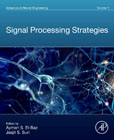
Advances in Neural Engineering Volume 1: Signal Processing Strategies
S. El-Baz, Ayman
Suri, Jasjit
Neural engineering is an emerging and fast-moving interdisciplinary research area that combines engineering with (a) electronic and photonic technologies, (b) computer science, (c) physics, (d) chemistry, (e) mathematics, and (f) cellular, molecular, cognitive, and behavioral neuroscience. This helps us understand the organizational principles and underlying mechanisms of the biology of neural systems and to further to study the behavioral dynamics and complexity of neural systems in nature. The field of neural engineering deals with many aspects of basic and clinical problems associated with neural dysfunction, including (i) the representation of sensory and motor information, (ii) electrical stimulation of the neuromuscular system to control muscle activation and movement, (iii) the analysis and visualization of complex neural systems at multiscale from the single cell to system levels to understand the underlying mechanisms, (iv) development of novel electronic and photonic devices and techniques for experimental probing, the neural simulation studies, (v) the design and development of human-machine interface systems and artificial vision sensors, and (vi) neural prosthesis to restore and enhance the impaired sensory and motor systems and functions. To highlight this emerging discipline, Dr. Ayman El-Baz and Dr. Jasjit Suri have developed Advances in Neural Engineering, covering the broad spectrum of neural engineering subfields and applications. This Series includes 7 volumes in the following order: Volume 1: Signal Processing Strategies, Volume 2: Brain-Computer Interfaces, Volume 3: Diagnostic Imaging Systems, Volume 4: Brain Pathologies and Disorders, Volume 5: Computing and Data Technologies, Volume 6: Advanced Brain Imaging Techniques and Volume 7: Neural Science Ethics. Volume 1 provides a comprehensive review of dominant feature extraction methods and classification algorithms in the brain-computer interfaces for motor imagery tasks. The authors discuss existing challenges in the domain of motor imagery brain-computer interface and suggest possible research directions. Presents Neural Engineering techniques applied to Signal Processing, including featureextraction methods and classification algorithms in BCI for motor imagery tasksIncludes in-depth technical coverage of disruptive neurocircuitry, including neurocircuitry of stress integration, role of basal ganglia neurocircuitry in pathology of psychiatric disorders, and neurocircuitry of anxiety in obsessive-compulsive disorderCovers neural signal processing data analysis and neuroprosthetics applications, including EEG-based BCI paradigms, EEG signal processing in anesthesia, neural networks for intelligent signal processing, and a variety of neuroprosthetic applicationsWritten by engineers to help engineers, computer scientists, researchers, and clinicians understand the technology and applications of signal processing INDICE: 1. Framework for segmentation, optimization, and recognition of multivariate brain tumors. 2. The Neural Circuitry of PTSD - An RDOC Approach 3. CNN-based Artifact Recognition from Independent Components of EEG Signals 4. Deep multimodal representation learning for non-invasive neural speech decoding 5. Neural signals processing using deep learning for diagnosis of cognitive disorders 6. Brain tumor recognition using Semi Supervised Generative Adversarial Network 7. Multivariate adaptive signal decomposition techniques and their applications to EEG signal processing: An introduction 8. Split Learning for Human Activity Recognition 9. Machine Learning Approaches for Epilepsy Analysis in Current Clinical Trials 10. Brainwave and Head Motion Control of a Smart Home for Disabled People 11. Blind source separation methods for motor imagery-based brain-computer interfaces 12. Advancing neural engineering: hierarchical control strategies with human-centered focus for hand prosthetics 13. Advances in non-invasive EEG-Based brain-computer interfaces: signal acquisition, processing, emerging approaches, and applications
- ISBN: 978-0-323-95437-2
- Editorial: Academic Press
- Encuadernacion: Rústica
- Páginas: 420
- Fecha Publicación: 01/11/2024
- Nº Volúmenes: 1
- Idioma: Inglés
